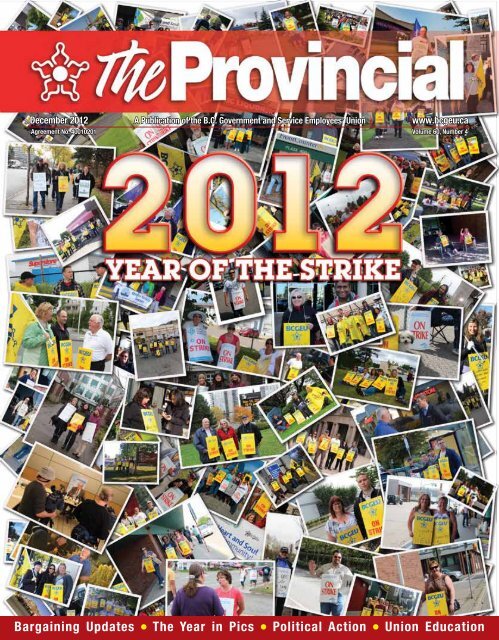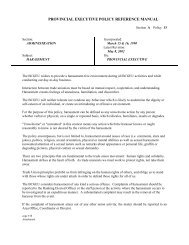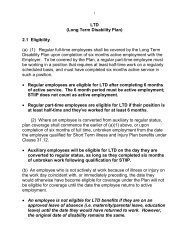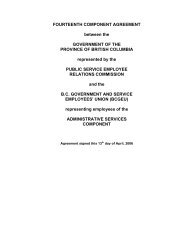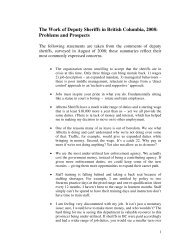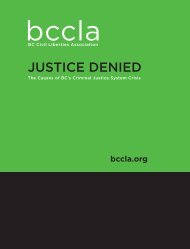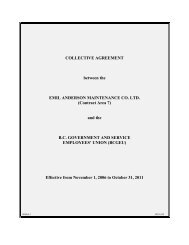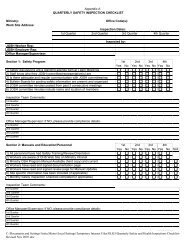Provincial - December 2012 - BC Government and Service ...
Provincial - December 2012 - BC Government and Service ...
Provincial - December 2012 - BC Government and Service ...
Create successful ePaper yourself
Turn your PDF publications into a flip-book with our unique Google optimized e-Paper software.
Taking care of otherswhen you can’t takecare of yoursaurie Scotthas been hasbeen a CommunitySocial <strong>Service</strong>s workerfor 25 years – <strong>and</strong><strong>BC</strong>GEU steward for20. In October, Laurie addressed theCommunity Social <strong>Service</strong>s Employer’sAssociation to put a face to the strugglesof some of the lowest paid workersin the broad public sector. Following isa condensed version of her remarks:always coveragewhen an employeeneedstime off, evenwhen they aresick. There is asteady outflowof good peopleleaving thesector becausethey just can’tmake a living.When I chose this work, I knew Iwouldn’t get rich, but that wasn’tmy objective. I wanted to workwith young people, something Iam passionate about.I have met so many people whoare in this field for that samereason. They support the disabled,vulnerable women, at-risk youth,families <strong>and</strong> children in community-basedprograms.They love what they do. They can’timagine doing anything else. Theyare committed, dedicated professionalsdoing amazing work in ourcommunities.When people have to leave thework they love because they can’tmake ends meet, it breaks myheart. As the cost of living hassteadily increased <strong>and</strong> wages inour sector have stagnated, I hearthis from staff more <strong>and</strong> moreoften. I know a number of peoplewho work second jobs just tobreak even.Many people in this sector arerunning on empty. There isn’tI want to share some stories thatreflect our day-to-day challenges.When the sole breadwinner of afamily of four returned to workin the city, finding a new hometo rent became a daunting task.Nothing was affordable on hiswage. In the end, the three familypets were put out for adoption.The right kind of house wastoo expensive. The family wasdevastated.I know a single parent with fourchildren who worked part-timein a residential program, takingadditional shifts whenever possible.Her family became foodbank regulars. When she could,she went full-time to avoid thefood bank, but some months arestill “pretty tight”. She is afraid ofgetting sick or hurt. She has nosavings. If anything happens <strong>and</strong>she didn’t have enough sick days,she wouldn’t be able to take careof her children.My brother-in-law got a job withthe Ministry of Highways workingin the road sign shop. I admitit stung when I discovered that hisstarting wage was more than I wasmaking after 10 years.For 15 years, I was the primarycaregiver for my gr<strong>and</strong>mother,who developed dementia. Mylife eventually became work <strong>and</strong>gr<strong>and</strong>ma. The waitlist for anysubsidized senior’s care was two tofive years! Other places were tooexpensive.Thankfully, my family <strong>and</strong> I wereable to pull together <strong>and</strong> care forher. I was lucky <strong>and</strong> got lots of supportfrom my employer. The sameis not true for everyone out there.Our work dem<strong>and</strong>s that we be atour best. Our days are sometimeslong <strong>and</strong> stressful. Our clientscan, at times, be challenging,violent or heartbreaking. Ourcommitment keeps us comingback. When we can’t afford to takecare of our own families, how canwe continue to take care of anyone else?Watch Laurie’s full talk online:http://youtu.be/1Fk5YPN_jv8.When peoplehave to leavethe work theylove becausethey can’tmake endsmeet, it breaksmy heart...I know anumber ofpeople whowork secondjobs just tobreak even.5
B.C. government serviceworkers ratify agreementProfessional fees unresolved66<strong>BC</strong>GEU members have ratified a new twoyeardeal reached with the provincial governmentat the end of September. Sixty four percent of the bargaining unit voted in favourof the 16th Master Agreement, which was recommendedby the bargaining committee.Members also ratified the component agreements.“We fought long <strong>and</strong> hard to achieve this new masteragreement. I’m delighted it has been accepted by ourmembers,” said <strong>BC</strong>GEU President Darryl Walker.“We got everything that was possible to get out of thisround of bargaining. We didn’t leave a nickel on thetable <strong>and</strong> didn’t make any concessions,” said Walker.Walker credits <strong>BC</strong>GEU members for backing thebargaining committee with a strong strike vote <strong>and</strong>strike action during nine months of negotiations.The highlights include:EMPLOYMENT SECURITY – The memor<strong>and</strong>umon employment security was renewed. It applies toall regular employees employed by the province as ofApril 1, <strong>2012</strong>.These changes provide important protection to workerswho may be impacted as the province proceedswith its plan to reduce the size of the public serviceby 2,000 positions during this fiscal year <strong>and</strong> next.LDB – The government withdrew its request forproposals (RFP) to privatize liquor distribution,thereby cancelling the government’s plan to selloff liquor distribution warehouses <strong>and</strong> the entiredistribution system.EMPLOYEE RIGHTS – We negotiated improvementsto address bullying in the workplace.ALLOWANCES – We negotiated increases to vehicle<strong>and</strong> meal allowances.TRAVEL ADVANCE – All employees, includingauxiliaries, will now qualify for the benefit.AUXILIARY EMPLOYEE BENEFITS – Auxiliarymembers will receive two increases in health <strong>and</strong>Burnaby – <strong>BC</strong>GEU staff <strong>and</strong> electedofficials take part in the meticulousprocess of sorting <strong>and</strong> counting ballotsduring the ratificatoin vote for directgovernment service workers’ 16thMaster Agreement.welfare benefits over the life of the agreement. Thefirst will see payment in lieu of benefits increase to$46.90 biweekly. The rate will increase to $49.00on April 1, 2013.WAGES – We negotiated a four per cent pay hikeover the term of the agreement. One per cent raisestook effect retroactively to April 1, <strong>2012</strong><strong>and</strong> onAugust 15, <strong>2012</strong>. Another one per cent increase willtake effect April 1, 2013<strong>and</strong> <strong>December</strong> 1, 2013.The agreement also saw the continuation of currenttemporary market adjustments.The two-year agreement expires March 31, 2014.The <strong>BC</strong>GEU will continue to pursue improvementsin wages, benefits, job security, professional fees <strong>and</strong>working conditions.We’ll be consulting members in 2013 for other proposalsfor the next agreement.The <strong>BC</strong>GEU remains frustrated the issue of professionalfees wasn’t settled to the union’s satisfaction.“We’re concerned about the government’s stated positionit could only reimburse our members up to the2009 schedule for professional fees,” said Walker.“In the days before we ratified our agreement, welearned the government agreed to pay the 2011-12fee rate to another public service union. The differencewill cost our members hundreds of dollarsin fees annually. This deceit doesn’t bode well for acooperative working relationship with government.”“We goteverything thatwas possibleto get out ofthis round ofbargaining. Wedidn’t leave anickel on thetable <strong>and</strong> didn’tmake anyconcessions.”
<strong>BC</strong>GEU campaign haltsLiquor DistributionBranch privatization“Once weestablished jobprotection inthe event thesell-off wentthrough, weplanned <strong>and</strong>then rolled outa campaignto defendthis importantpublic asset.”Fighting Back – <strong>BC</strong>GEU pres.Darryl Walker (top centre): talks with<strong>BC</strong>GEU members at the VancouverLDB warehouse (Bottom, l-r): SonyaJohnson, Marie Pretchuk <strong>and</strong> AnnetteTaylor show some of the 50,000petition names opposing LDB sell-off.Convincing a government to reverse course isnever easy. But that is exactly what <strong>BC</strong>GEUmembers accomplished when the provincialgovernment announced in September that itwas ab<strong>and</strong>oning the privatization of the Liquor DistributionBranch warehouse <strong>and</strong> distribution system.“The <strong>BC</strong>GEU has successfully opposed earlier attemptsto privatize the public liquor distribution systemin our province <strong>and</strong> our members were preparedto defend it again,” says Darryl Walker, president ofthe <strong>BC</strong>GEU. “Once we established job protection inthe event the sell-off went through, we planned <strong>and</strong>then rolled out a campaign to defend this importantpublic asset.”A key part of the campaign was a petition drive thatsaw <strong>BC</strong>GEU members out all around the province,engaging members of their community in a discussionabout the LDB. In the process these volunteerscollected a staggering 50,000 signatures opposing theprivatization of the LDB.Letter-writing, lobbying, leafleting as well as radio<strong>and</strong> online advertising played an important part inthe campaign.“I want to thank the union activists who worked sohard on this campaign,” says Craig MacKay, Retail,Stores <strong>and</strong> Warehouse chair. “Whether it was collectingsignatures, emailing MLA’s, wearing ourcampaign buttons, or supplying the public with informationon the sell-off, it was our members hard work<strong>and</strong> dedication that made this campaign a success.”The current system has served B.C. well for decades.In the last five years, the liquor distribution <strong>and</strong> retailsystem contributed a net income of $4.3 billion. Thatmoney goes to help pay for public services that weall rely on such as health care, seniors care, education<strong>and</strong> highways.The mix of rural agency stores, privately operatedneighbourhood stores <strong>and</strong> government liquor storeswith consistent province-wide pricing, all supportedby central distribution, works well for consumers.“The LDB system should not be broken up – thecentral distribution system <strong>and</strong> the stores must staytogether in a single system – it’s what makes it work,”says Walker.In his review of government operations in Ontario,Don Drummond, former Chief Economist with theTD Bank, rejected the sell-off of the pubic LiquorControl Board of Ontario. Instead of privatization,Drummond called for the opening of additionalpublic liquor stores.He also recommended that the Ontario governmentfully utilize the LCBO’s sizeable purchasing power.That would allow the LCBO to improve profits<strong>and</strong> create additional government revenue forpublic services.“Don Drummond’s recommendations present a clearalternative to selling off an important, revenue generating,public asset,” says Walker. “The same approachneeds to be taken here in B.C. We know the public issolidly behind the expansion of public liquor stores<strong>and</strong> services.”The <strong>BC</strong>GEU proposed Sunday openings for publicliquor stores. This would bring in about $125 millionper year in additional provincial revenue. The <strong>BC</strong>GEUalso proposed extending the shopping hours at publicstores <strong>and</strong> opening new stores. Each new public storewould produce about $5 million in additional provincialrevenue per year.7
Health BargainingCOMMUNITYHEALTHIn health care, over 8,000 ofour members are waiting fora deal in community healthbargaining. Bargaining began inJanuary <strong>2012</strong>, <strong>and</strong> members gavethe bargaining committee a strongstrike m<strong>and</strong>ate in October.The Community BargainingAssociation (CBA) reviewed theemployer’s latest offer <strong>and</strong> therewas no change in its position.HEA<strong>BC</strong> continues to hold theposition that an increase in wagesmust be accompanied by anoffset found within the collectiveagreement.In early November, the CBA decidedto action the strike m<strong>and</strong>ate.The Community HealthBargaining Association is continuingto discuss the next steps.Talks resumed on November 20.If progress is not made, workersin community health will continuelimited job action to send a clearmessage to health employers thatit’s time for a fair deal. Workersin this sector are among thelowest paid workers in the publicsector, <strong>and</strong> haven’t had a payraise since 2009.The CBA represents more than14,000 members, the majorityof whom are represented by the<strong>BC</strong>GEU. Other unions at the tableare UFCW, HEU, CUPE, HSA,USWA, CLAC <strong>and</strong> <strong>BC</strong>NU.<strong>BC</strong>GEU staff <strong>and</strong>elected officialscount the ballotsin the recentCommunity Healthsector strikevote, at the unionheadquarters inBurnaby.FACILITIESA tentative agreement has beenreached between the multi-unionFacilities Bargaining Association<strong>and</strong> the Health Employers’Association of <strong>BC</strong> (HEA<strong>BC</strong>).The agreement covers more than46,000 health care workers in hospitals,long-term care facilities <strong>and</strong>diagnostic treatment centres, aswell as health authority offices <strong>and</strong>warehouses, <strong>and</strong> other settings.The two-year settlement comesafter nine months of difficult negotiations.It includes:• A moratorium on layoffs due tocontracting out for the life of theagreement;• The continuation of benefits;• Across-the-board wage increasestotaling three per cent;• The continuation of the existingagreement covering membersof the <strong>BC</strong>GEU working for theprovincial ambulance service;• The continuation of the existingagreement covering members ofCUPE Local 873.The FBA unions are recommendingthe tentative agreementto members.HEALTH SCIENCEPROFESSIONALSHealth sciences professionalsvoted 90 per cent in favourof strike action, backingtheir bargaining committee innegotiations with B.C.’s healthemployers.The Health Science ProfessionalsBargaining Association (HSPBA)will be taking this strong strikem<strong>and</strong>ate with them back to thebargaining table.The HSPBA had been at thebargaining table for seven monthsto negotiate a new collectiveagreement, but talks broke downOctober 31. The government<strong>and</strong> health authorities have notresponded to a proposed wageincrease, <strong>and</strong> they refuse torespond to repeated requestsfor costing on proposed budgetsavingmeasures.HSPBA represents 17,000 healthscience professionals workingin hospitals <strong>and</strong> communitiesthroughout <strong>BC</strong>. Health SciencesAssociation is the lead union, <strong>and</strong>members are also represented byCUPE, <strong>BC</strong>GEU, PEA, <strong>and</strong> HEU.If progressis not made,workers incommunityhealthwill continuelimited jobaction to senda clear messageto healthemployers thatit’s time for afair deal.10
<strong>BC</strong>GEU rolls outpolitical action planThe <strong>BC</strong>GEU has implemented a political action plan tomobilize members in the months leading up to May2013 provincial election.“Political action is essential to our union,” said Darryl Walker,<strong>BC</strong>GEU president. “<strong>BC</strong>GEU members <strong>and</strong> their families havebeen hit hard by 12 years of regressive <strong>and</strong> harmful policies bythe B.C. Liberal government. We can’t afford to sit silent inthis election.”The plan, put forward by the union’s ad hoc political actioncommittee <strong>and</strong> endorsed by the <strong>Provincial</strong> Executive, includeseducation on the importance of voting, engaging membersacross the province in political action, <strong>and</strong> encouraging NDPmembers to get involved in local campaigns.Brenda Brown, vice-president <strong>and</strong> chair of the political actioncommittee, says the union will also support members who arerunning for office. “What better way to ensure our members’issues <strong>and</strong> concerns are addressed than by electing <strong>BC</strong>GEUmembers to the legislature,” Brown said.So far, George Heyman, <strong>BC</strong>GEU president emeritus, <strong>and</strong>Sherry Ogasawara, a health care worker in Prince George,are NDP c<strong>and</strong>idates. Other <strong>BC</strong>GEU members are seekingnominations.A key part of the plan is training activists to talk tomembers about the election. “We can’t shy away fromtalking politics with our members,” Walker said.“We’ll be going member to member — in coffeerooms, at union meetings, over the phone, on thedoorstep. Our hope is that every member, in everycommunity, is engaged in political action over thenext six months.”The union is also incorporating political action inconferences. In October, 65 members in the northernregion took part in a regional women’s conference,focusing on political action to end the growinginequality in <strong>BC</strong>.In her keynote address, Stephanie Smith, <strong>BC</strong>GEUtreasurer, reminded participants of the Liberals’ massivecuts to services that specifically impact women— legal aid, women’s centres, seniors’ care, welfare,disability benefits, education <strong>and</strong> training, victims’services, violence programs <strong>and</strong> human rights.“<strong>BC</strong>GEUmembers <strong>and</strong>their familieshave beenhit hard by12 years ofregressive<strong>and</strong> harmfulpolicies bythe <strong>BC</strong> Liberalgovernment.We can’t affordto sit silent inthis election.”(top) <strong>BC</strong>GEU members engaged in the recent provincial by-electioncampaigns. (bottom, l-r) Province columnist Mike Smyth, pres. Walker,MLA Rob Fleming, <strong>BC</strong> Fed sec. treas. Irene Lanzinger.“We need to make our voices heard—in our workplaces,in our union, in our communities, <strong>and</strong> at theballot box,” Smith said.At the <strong>BC</strong>GEU regional conference in Victoria, alsoin October, 135 members from across VancouverIsl<strong>and</strong> focused on building links between unions <strong>and</strong>communities, <strong>and</strong> strategized how best to engagemembers in political action.President Walker reminded participants the union hasa responsibility to protect members’ jobs <strong>and</strong> services,<strong>and</strong> influence public policies that impact members<strong>and</strong> their communities.“The best way we can do that is by electing peoplewho will st<strong>and</strong> up <strong>and</strong> speak out on our members’issues, by electing a government that will put theinterests of ordinary working people ahead of bigbusiness,” Walker said.The conference featured a keynote address by MurrayRankin, NDP Victoria federal by-election c<strong>and</strong>idate,<strong>and</strong> a political panel with Irene Lanzinger, secretarytreasurerof the <strong>BC</strong> Federation of Labour, MLA RobFleming, <strong>and</strong> Province columnist Mike Smyth..11
12Highways extensions good for <strong>BC</strong>GEUmembers <strong>and</strong> the travelling publicIn October the Ministry of Transportation <strong>and</strong> Infrastructureannounced that it had reached agreements withthe B.C. Road Builders & Heavy Construction Associationto extend existing provincial highway maintenanceagreements in 25 services areas represented by the <strong>BC</strong>GEU.The announcement was the culmination of complexbargaining between the <strong>BC</strong>GEU, several highways contractorsagainst an ironclad deadline imposed by the provincialgovernment to negotiate new collective agreements.“These highways maintenance contract extensions are goodfor our members,” says <strong>BC</strong>GEU president Darryl Walker.“They are also very good news for the travelling public.These extensions ensure that the most experienced highwaysworkers in the province will be maintaining our roads <strong>and</strong>highways for years to come.”The maintenance agreements will run an additional five years,through to 2018-19. Earlier this year the <strong>BC</strong>GEU negotiatednew collective agreements in these service areas.Province-wide issues were negotiated at a first-ever provincialtable. Negotiations then moved to local tables to negotiateissues specific to local service areas.The new agreements include wage increases <strong>and</strong> significantimprovements to auxiliary members’ benefits. The <strong>BC</strong>GEUwill also have a seat on the transCDA Road Building Committeewhich will allow the union to advocate for its members.“The establishment of a provincial table to discuss commonissues was crucial in these successful contract negotiations,”says Operational <strong>Service</strong>s Component chair Mike Nuyens.“I hope we can build on this cooperation going forward.”Region 1 women brainstorm political actionPolitical action is essential to our union, our families<strong>and</strong> our communities. That was the resounding messageat the Area 4 Women’s Conference held mid-October in Prince George.The conference brought dozens of women from northern B.C.together to brainstorm ways to make their voices heard in nextMay’s provincial election.<strong>BC</strong>GEU Treasurer Stephanie Smith kicked off the event witha speech calling on women to empower each other to takeaction.“We need to organize, ask tough questions, to work on campaigns<strong>and</strong> consider what’s at stake <strong>and</strong> where the c<strong>and</strong>idates<strong>and</strong> parties st<strong>and</strong> on issues affecting women,” said Smith.Top of the early childhood educator’s want list from the nextB.C. government is universal publicly funded childcare.In her speech, vice president Brenda Brown articulated theneed of unions <strong>and</strong> their members to act politically.“We have a duty <strong>and</strong> responsibility to protect our members’jobs <strong>and</strong> the services they provide. We need to influence publicpolicies <strong>and</strong> government decisions that impact our members,our families <strong>and</strong> our communities,” said Brown.Vice President Lorene Oikawa noted the B.C. Liberal <strong>Government</strong>’sabysmal record on women’s issues as the main reasonshe favours political action.“The record has been dismal, especially for Aboriginals,women of colour, immigrants, refugees, those with disabilities,lesbian, single mothers, poor <strong>and</strong> elderly,” said Oikawa.<strong>BC</strong>GEU members can expect to hear more about the union’spolitical action around the 2013 provincial election.
Education Fair offersbite-sized intros tounion coursesThis autumn, the <strong>BC</strong>GEUrolled out a new educationalconcept for members<strong>and</strong> activists – introductorycourses in popular subjectareas that will hopefully spurmembers to come back for more.The Education Fair concept offersinformation sessions on topicalissues in a manageable format thatfits members’ busy schedules.Lynda Morrice is the <strong>BC</strong>GEUEducation Officer who coordinatedthe Education Fair, in consultationwith the Lower Mainl<strong>and</strong>(Area 03) <strong>and</strong> Fraser Valley(Area 04) Cross ComponentCommittees.“We wanted to find a way to bringin really short education coursesthat people could attend <strong>and</strong> geta flavour of what we offer,” saidMorrice. “And at the same time,we hope they would become moreinvolved with the union.“So we decided to offer it on aSaturday, in one-hour sessions.Members could come in for onehour, or they could come in for allthree hours. We also had a BBQso that people could connect witheach other, <strong>and</strong> engage with theirlocal executive.”The objective is to provide coursesthat many members have an interestin, such as Health <strong>and</strong> Safety.Courses including WorkplaceBullying <strong>and</strong> Violence in the workplacewere well attended.A third course on Pensions requireda broader perspective.Education isknowledge. Ifmembers areeducated, wecan underst<strong>and</strong>what stepsare neededto remedy thesituation in theworkplace.”(Top) Members take ina Pensions workshopat Burnaby HQ.(Bottom) Members atthe Langley office takepart in a workshopon Bullying in theWorkplace.“Some of our members don’t havea pension plan, so we providedinformation around the CanadaPension Plan <strong>and</strong> Old AgeSecurity, as well as the differencesbetween Defined Benefit <strong>and</strong>Defined Contribution plans,”said Morrice.The Climate Change sessiongrew from an earlier <strong>BC</strong>GEULabour Institute course that taughtmembers how to teach a climatechange course in theircommunities.Vice president Brenda Brownparticipated as one of the presentersin the workshop.“We had a huge number of signupsfor the sessions,” says Morrice.“And probably 90-95 per cent ofthose attending were memberswho I’d never seen before.”Judging from participants’ feedback,the Education Fair is popularamong <strong>BC</strong>GEU members.MEMBER FEEDBACK“It was a perfect fit, not only for myself, but in myday-to-day role as a supervisor,” Liquor DistributionBranch security supervisor Curtis Miller told The<strong>Provincial</strong>. “I came in not knowing what to expect.The group participation was great, a very open forum,<strong>and</strong> both instructors were very clear <strong>and</strong> concise <strong>and</strong>informative in answering questions.”“I’ve found the workshops very informative <strong>and</strong> itdoes create awareness – especially bullying <strong>and</strong>violence in the workplace – big issues that I found veryinformative,” said Vancouver Coastal Health employeeCory Holton.”“I would encourage many of my co-workers to take thecourses,” said Deputy Sheriff Dave Iorizzo. “Thesewere just one hour courses, to give a bit of a flavor ofwhat the 8 hour courses are like, <strong>and</strong> I’d encourageanybody to come <strong>and</strong> take the courses.”“Education is knowledge,” said a female membertaking the bullying workshop who did not want to beidentified. “If members are educated on a subject, wecan underst<strong>and</strong> what steps are needed to remedy thesituation in the workplace.”13
Bargaining updates change frequently. Theseupdates are up-to-date as of press time. For morefrequent updates, visit the <strong>BC</strong>GEU web site at:www.bcgeu.caPost Secondary support staff reach tentative agreementFollowing a number of successful days of job action, the Post-Secondary Employers Association (PSEA) requested that theCollege <strong>and</strong> Institute Support Staff Bargaining Association(CISSBA) return to the provincial bargaining table to negotiatea template for the monetary issues.On <strong>December</strong> 5, CISSBA announced that a template-tableagreement had reached with the employer. Details on theagreement will be distributed to members prior to a ratificationvote. Local bargaining tables will resume negotiations withemployers to resolve outst<strong>and</strong>ing issues <strong>and</strong> organize ratificationvotes for local <strong>and</strong> template agreements.LifeLabs mediation fails to deliver new agreement<strong>BC</strong>GEU LifeLabs bargaining committee members met with theemployer <strong>and</strong> a mediator at the Labour Relations Board (LRB)in Vancouver on November 27, but failed to deliver a newcollective agreement.The employer indicated it was willing to withdraw its concessions,but with strings attached. LifeLabs proposed a packagecontaining no wage increase in the first year of a deal <strong>and</strong> onlya ‘modest’ increase in the second year. LifeLabs has applied tothe LRB for essential service designations. There will NOT beany job action until essential service designations are in place.Strike Action taken at <strong>BC</strong>IT<strong>BC</strong>IT Vocational Instructors <strong>and</strong> Support Staff took strikeaction on <strong>December</strong> 3 at all <strong>BC</strong>IT Campuses. <strong>BC</strong>GEU VocationalInstructor <strong>and</strong> Support Staff members who work at K-12sites <strong>and</strong> Kelowna withdrew their services but did not pickettheir worksites. Day school <strong>and</strong> night school classes were alsopicketed out.Vocational instructors <strong>and</strong> support staff also took strike actionon November 28, affecting the Burnaby campus, Downtown,Marine <strong>and</strong> Great Northern Way campuses. Having reached atentative agreement as part of CISSBA, support staff are nownegotiating a local agreement with the employer.Douglas College support staff take strike actionSupport staff at Douglas College in Coquitlam went on strikeon November 21 for one day in support of a fair <strong>and</strong> reasonabledeal. College administrators decided to cancel daytime classes<strong>and</strong> activities at the David Lam campus in Coquitlam. DouglasCollege’s main campus in New Westminster was shut down forone day on November 14 as part of the same strike action.Health Science Professionals take strike action<strong>BC</strong>GEU members working as Pharmacists, Public Health Inspectors,Environmental Health Officers, Inspector UPP,<strong>and</strong> Technologist Environmental took job action that saw aprovince-wide withdrawal of services, but without picket lines.Thursday, <strong>December</strong> 6th:Pharmacists went to essential service levels.Friday, <strong>December</strong> 7th:Public Health Inspectors, Environmental Health Officers,Inspector UPP, <strong>and</strong> Technologist Environmental went toessential service levels.Community Living <strong>BC</strong> members ratify agreementA tentative two-year agreement has been ratified for over 400<strong>BC</strong>GEU members directly employed by Community LivingB.C. Members voted by a significant majority in favour of thetwo-year deal, which provides for a 2 per cent wage increase ineach the two years.The new agreement replicates the improvements in benefits<strong>and</strong> business expenses contained in the public service collectiveagreement. It also renews important employment securityprotection <strong>and</strong> replicates the improvements in benefits <strong>and</strong>business expenses in the public service collective agreement.It also renews important employment security protection foranother two years.Envirotest Canada tentative agreementThe Bargaining Committee is pleased to announce that thetentative agreement reached on November 2, <strong>2012</strong> has beenstrongly ratified by the members of Envirotest Canada.15


